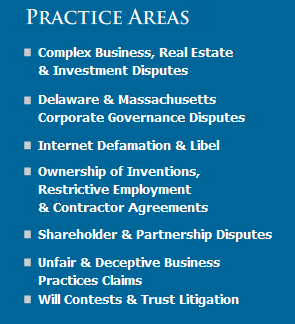Deceptive Business Practices Litigation; Chapter 93A Litigation.
A consumer or business injured by deceptive acts or practices in the conduct of business in Massachusetts may recover damages and attorney’s fees under Massachusetts General Laws, Chapter 93A. Unlike the businessman plaintiff, a consumer plaintiff must make a formal demand on the defendant as a condition of filing suit. Absent giving the business defendant an opportunity to make a reasonable settlement offer in response to a demand specifying the alleged wrongdoing, the injury suffered and referencing Chapter 93A, the consumer may not sue for unfair and deceptive acts and practices.
The standard for determining whether something is “deceptive” is one of common sense. Obviously a communication made with the intent to deceive another person is deceptive. But intent to deceive is not always necessary. An act or practice is deceptive if it could reasonably cause a person to act differently from the way he would act if he knew the truth about the matter. In making this determination regard must be had to the effect which the act or practice might reasonably be expected to have upon the general public.
Unlike common law fraud, an injured party need not prove that he relied on a misrepresentation resulting in an injury to him. It is enough, and there may a recovery, if there is a causal connection between the unfair or deceptive act and the specific losses for which the plaintiff seeks recovery.
The standard for determining whether something is “unfair” is not as straightforward. Clearly an act or practice is “unfair,” if it falls within some established concept of un- fairness. But the act or practice may be “unfair” even if technically legal under other laws but still unfair. A defendant’s actions toward the plaintiff are “unfair” if those actions are unethical, or oppressive, or unscrupulous, or otherwise unconscionable. The standard of “fairness” is viewed through the lenses of the commercial marketplace where, on the one hand, people don’t expect to be cheated but, on the other hand, they reasonably expect arms’ length dealings to not be “unethical” or “unscrupulous.” The question often asked is whether the conduct attains a level of rascality that would raise an eyebrow of a person who is used to the rough and tumble of the world of commerce.
A plaintiff is entitled to multiple (not more than treble and not less than double) damages if the unfair or deceptive acts that caused his injury were willful or knowing.
An unfair or deceptive statement is “willful” if the speaker represents a fact to be true without knowing whether it is true or not, and with reckless disregard for whether it is true or not. An unfair or deceptive statement is “knowing” if the speaker represents a fact to be true while knowing that it is not true.
An unfair or deceptive act is “willful” if the person intends to commit an unfair or deceptive act. An unfair or deceptive act is “knowing” if the person, whatever his intent, knows that by doing so he or she is committing an unfair or deceptive act.
Chapter 93A provides one of those rare instances where legal fees incurred in a lawsuit may be assessed to the wrongdoer. If the statute is violated, the Court must make an award of a reasonable attorney’s fee to the injured party.
Attorney’s Fees as Damages
Sometimes unfair and deceptive acts or practices may cause a party to expend legal fees. Suppose a deep pocket company agrees to pay for your company’s services and then withholds payment seeking to obtain an unwarranted, discounted settlement with the threat of protracted litigation. Or, the deep pocket company repeatedly assures you of payment and convinces you to provide additional service all the while having no intention of paying. That type of conduct is unscrupulous.Conduct in disregard of known contractual arrangements and intended to secure benefits for the breaching party constitutes an unfair act or practice. The Courts are empowered to treat the legal fees expended by the wronged party as damages. And if the unfair and deceptive acts were willful or knowing, those damages at a minimum must be doubled. Columbia Chiropractic Group, Inc. v. Trust Insurance Co., 430 Mass. 60 (1999); Arthur D. Little v. Dooyang Corp., 147 F.3d 47 (1st Cir. 1998).

